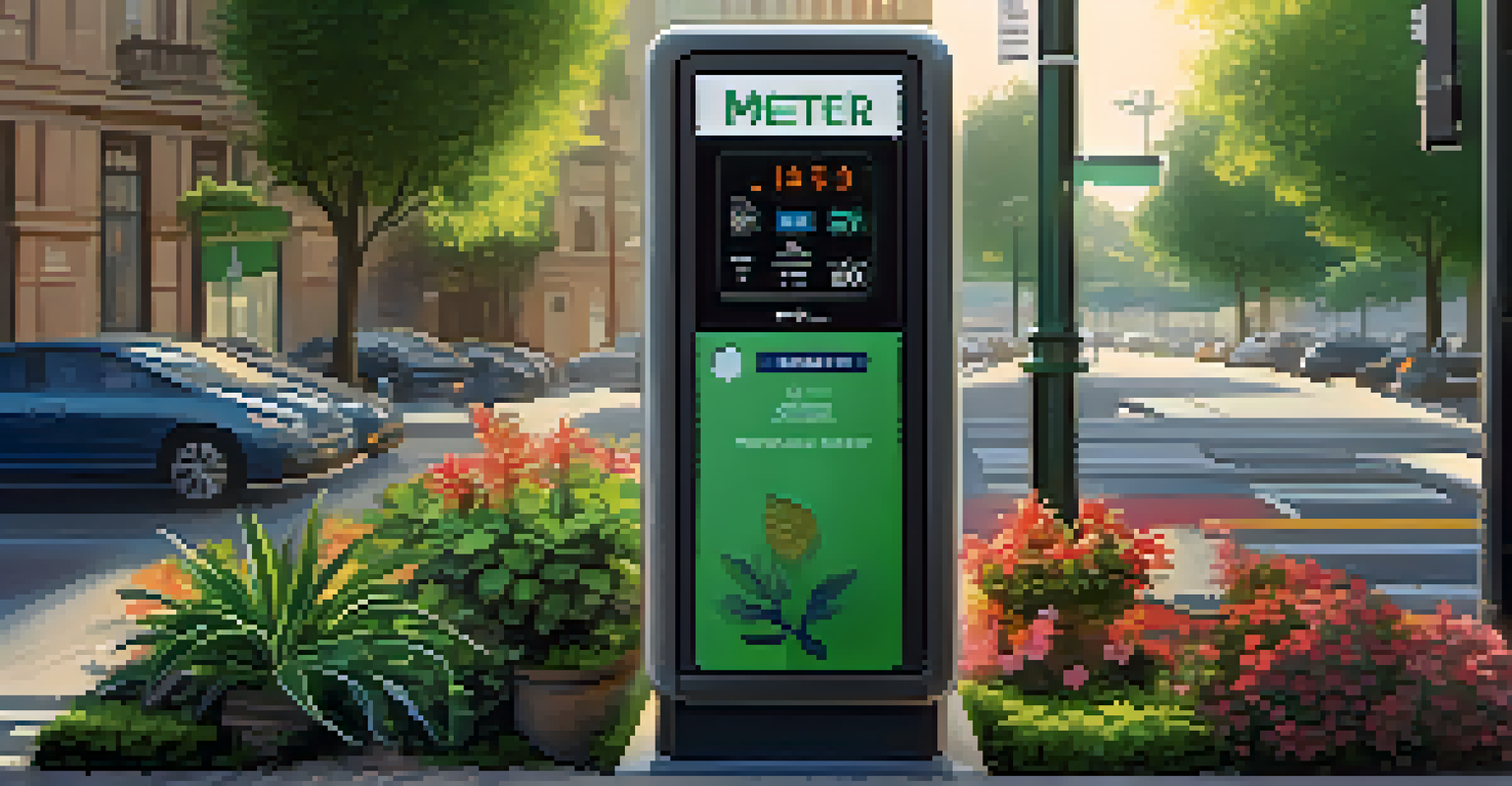Smart Parking Solutions Using IoT and Data Analytics

Understanding Smart Parking and Its Importance
Smart parking solutions are transforming how we find and manage parking spaces. The rise in urbanization has led to increased vehicle congestion, making efficient parking more crucial than ever. These solutions not only save time for drivers but also help reduce carbon footprints by minimizing the time spent searching for available spots.
The best way to predict the future is to create it.
By integrating technology such as sensors and mobile apps, smart parking systems provide real-time data about space availability. This innovation not only enhances user experience but also supports city planners in managing parking resources more effectively. As cities evolve, adopting smart parking can significantly improve urban mobility.
Moreover, smart parking is increasingly becoming a necessity due to the growing number of vehicles. With limited parking space available, these solutions offer a way to optimize existing resources, thereby enhancing convenience for residents and visitors alike. They pave the way for smarter cities that prioritize efficient transportation solutions.
The Role of IoT in Smart Parking Solutions
The Internet of Things (IoT) plays a pivotal role in the functionality of smart parking solutions. By connecting devices like sensors and cameras to the internet, real-time data can be gathered and analyzed, making parking more efficient. For instance, sensors can detect when a parking space is occupied or available, directly communicating this information to drivers via mobile applications.

This connectivity not only streamlines the parking experience but also enhances safety and security in parking facilities. IoT devices can monitor the condition of parking areas, alerting management about maintenance needs or security breaches. This proactive approach ensures that parking environments are safe and well-maintained, contributing to user satisfaction.
Smart Parking Enhances Urban Mobility
Smart parking solutions streamline parking management, reduce congestion, and optimize urban space usage.
Additionally, IoT can facilitate payment processes by allowing users to pay for parking directly through their smartphones. This eliminates the need for physical cash or meters, making the entire experience seamless. As IoT technology continues to evolve, we can expect even more innovative solutions to emerge in the parking space.
Data Analytics: Enhancing Parking Management
Data analytics is another crucial component of smart parking solutions. By analyzing the data collected from IoT devices, parking managers can gain insights into usage patterns and trends. For example, they can identify peak parking times and adjust pricing or availability accordingly, maximizing revenue while meeting user demand.
Technology is best when it brings people together.
Furthermore, data analytics can forecast future parking needs based on historical trends. This proactive approach allows cities to plan for expansions or modifications in parking infrastructure, ensuring they meet the evolving needs of their citizens. In essence, data-driven decision-making leads to more efficient and effective parking management.
Ultimately, the integration of data analytics not only improves operational efficiency but also enhances the overall user experience. By understanding user behavior and preferences, parking managers can tailor solutions that cater to their audience, making parking a hassle-free experience.
Benefits of Smart Parking for Urban Areas
Smart parking solutions offer a plethora of benefits for urban areas. One of the most significant advantages is the reduction in traffic congestion. When drivers can quickly locate available parking spots, it minimizes the time spent circling around streets, leading to less frustration and lower emissions.
Moreover, these solutions can help cities optimize land use. By efficiently managing parking spaces, urban planners can repurpose underutilized areas for other purposes, such as green spaces or community hubs. This holistic approach fosters a more sustainable urban environment, contributing to the overall quality of life for residents.
IoT and Data Analytics Drive Efficiency
The integration of IoT and data analytics enables real-time insights and proactive management of parking resources.
Additionally, smart parking solutions enhance revenue generation for cities. With better resource management and data-driven pricing strategies, municipalities can maximize their parking revenue, which can then be reinvested into public services or infrastructure improvements. This creates a win-win scenario for both city officials and residents.
Challenges in Implementing Smart Parking Solutions
Despite the numerous benefits, implementing smart parking solutions is not without challenges. One primary concern is the upfront cost of the technology and infrastructure required. Cities must weigh the initial investment against long-term savings and benefits, which can be a tough sell to stakeholders.
Another challenge is ensuring the interoperability of different systems and technologies. With various vendors offering different solutions, achieving a seamless integration can be complex. Cities must prioritize standardization and collaboration to ensure that all components work together effectively.
Finally, data privacy and security are significant concerns. As parking systems collect and analyze user data, safeguarding this information from potential breaches becomes crucial. Establishing robust security measures and transparent data policies is essential to build trust among users and encourage adoption.
Future Trends in Smart Parking Solutions
As technology continues to advance, the future of smart parking solutions looks promising. One exciting trend is the integration of artificial intelligence (AI) into parking management systems. AI can analyze vast amounts of data to predict parking availability and optimize space usage, taking efficiency to new heights.
Moreover, the rise of electric vehicles (EVs) is likely to shape the future landscape of parking. Smart parking solutions can be designed to accommodate EV charging stations, further promoting sustainable transportation options. This shift not only meets user needs but also aligns with global efforts toward reducing carbon emissions.
Challenges in Implementation Persist
Despite their benefits, smart parking solutions face challenges such as high initial costs, interoperability issues, and data privacy concerns.
Finally, we can expect greater emphasis on user experience enhancements. Features like personalized parking recommendations and real-time updates through mobile apps will become standard. As smart parking solutions evolve, the focus will remain on creating a convenient and enjoyable experience for users.
Conclusion: Embracing Smart Parking Solutions
In conclusion, smart parking solutions powered by IoT and data analytics are reshaping how we manage parking in urban environments. By embracing these technologies, cities can enhance efficiency, reduce congestion, and improve the overall user experience. The benefits are clear, making a strong case for the adoption of smart parking solutions.
However, it's essential to address the challenges that come with implementation, from costs to data security. By investing in the right technologies and prioritizing collaboration among stakeholders, cities can overcome these hurdles and fully realize the potential of smart parking.

As we look to the future, the integration of AI and other innovations will only enhance these solutions further. By staying ahead of the curve, cities can create a smarter, more sustainable parking ecosystem that meets the needs of their residents and visitors alike.